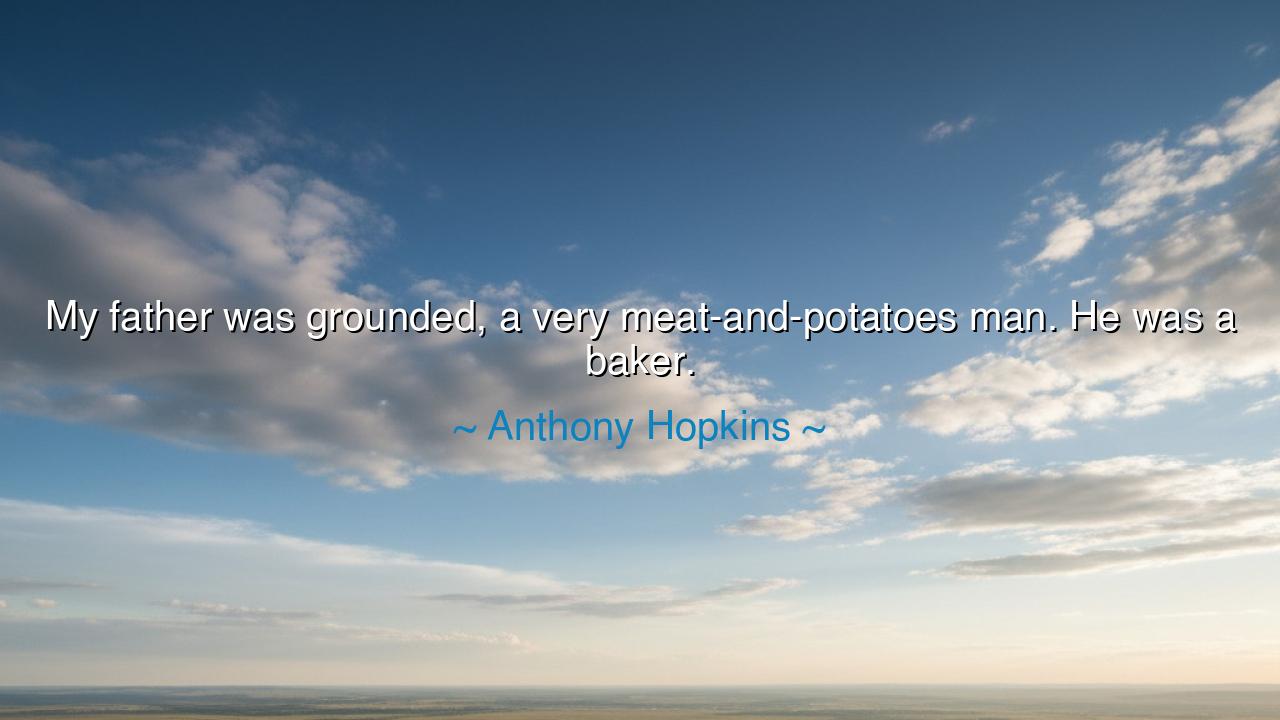
My father was grounded, a very meat-and-potatoes man. He was a






The words of Anthony Hopkins—“My father was grounded, a very meat-and-potatoes man. He was a baker”—are simple in form, yet they carry the weight of generations. Beneath their modest phrasing lies a quiet reverence for humility, honor, and the nobility of work. Hopkins, one of the greatest actors of his age, speaks not of fame or mastery here, but of the man who taught him what it means to live with steadiness—to stand firm upon the earth while reaching toward greatness. His father, a baker by trade, represents that ancient figure who rises before dawn, whose hands are rough with labor, yet whose spirit is pure with purpose. From the ovens of his craft came not only bread, but the discipline, honesty, and simplicity that shaped his son’s soul.
In the ancient spirit, such a man would have been honored as a craftsman of the hearth, a servant of both body and spirit. The baker is not merely one who feeds; he is one who sustains life through the sacred union of labor and nourishment. The ancients would have called his work holy, for in transforming raw grain into bread, he performs a quiet miracle of daily devotion. Hopkins’s father, a grounded man, embodied the wisdom that greatness is not measured by the height of one’s ambition, but by the depth of one’s integrity. He was a “meat-and-potatoes” man—not in ignorance, but in clarity. He understood that joy is found not in the excesses of luxury, but in the sufficiency of honest living, the warmth of family, and the satisfaction of work well done.
Hopkins’s reflection reveals the eternal truth that roots give rise to wings. The son who would one day walk upon the world’s grandest stages began his journey in a small bakery, amidst the scent of flour and fire, watching his father’s patience shape the dough into sustenance. There, in those humble mornings, he learned the rhythm of the world—the balance of effort and reward, of toil and grace. It was not glamour that molded him, but example. His father’s grounded nature anchored him to what is real, even as art later drew him toward the abstract. Without that grounding, his genius might have withered beneath the weight of its own fire.
History is full of such stories, where the greatness of the child blooms from the steadfast virtue of the parent. Consider Leonardo da Vinci, born the son of a humble notary, whose disciplined eye for detail and respect for craft shaped the master’s pursuit of perfection. Or think of Abraham Lincoln, whose father was a simple frontier farmer. From those furrowed fields Lincoln learned both the dignity of labor and the patience of growth—lessons that would one day guide him through the storms of leadership. In each case, the wisdom of the father, though plain in appearance, became the foundation of the child’s greatness. So it was with Hopkins: his father’s simplicity was not limitation, but legacy—the quiet moral compass that pointed him always back to truth.
The baker’s trade itself holds symbolism as old as civilization. Bread has ever been the food of humankind’s survival, and those who bake it carry the unspoken covenant of care. To call one’s father a baker is to say that he gave life in daily portions, through consistency and devotion. The “meat-and-potatoes” spirit speaks of honesty in the essentials, a refusal to be seduced by frivolity. Such people are the pillars of society—the unseen hands that keep the world upright while others chase its glories. Hopkins’s words, then, are not merely nostalgic; they are a hymn to the ordinary made sacred, to the wisdom that the most stable lives are built not upon brilliance alone, but upon steadfast character.
And yet, in this quiet portrait of the father, there is also a mirror held up to the son. For in honoring his father’s groundedness, Hopkins honors the balance between art and earth, between imagination and labor. The actor who can become kings and madmen alike must still remember the scent of bread rising in the oven, the patience it takes to wait, the satisfaction of creation that feeds others. The father’s bakery becomes a metaphor for all creation—the discipline that gives birth to beauty, the humility that gives shape to genius. In this way, Hopkins’s words are not only about his father—they are about the roots of authenticity that must sustain every soul that dares to rise.
So, dear listener, take this wisdom into your own life: honor the grounded people who shape you. Never despise the humble crafts, for within them lies the spirit of endurance and the secret to peace. Whether you are an artist, a scholar, or a dreamer, do not lose the grounding that gives meaning to your gifts. Rise high if you must, but never forget the earth beneath your feet—the steady rhythm of honest labor, the quiet dignity of those who build, mend, and feed.
Thus, the words of Anthony Hopkins become a timeless teaching: that true greatness is not born from ambition alone, but from groundedness, from roots that run deep in humility and love. His father, the baker, lives on not just in memory, but in every act of integrity, every creation made with patience, every life lived with balance between duty and dream. For as the ancients knew, the one who honors the simple things—the bread, the work, the earth—will never be lost in the storms of the world, for he stands upon the firm ground of the eternal.






AAdministratorAdministrator
Welcome, honored guests. Please leave a comment, we will respond soon